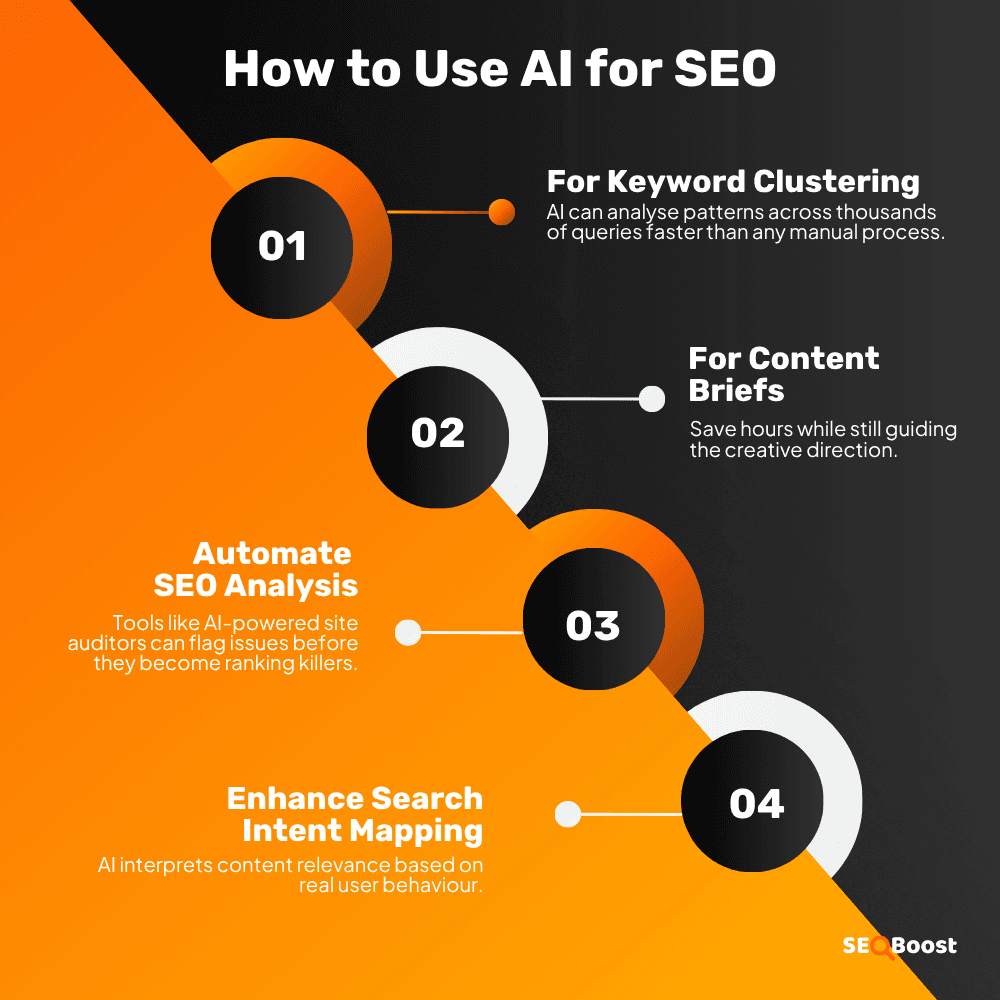Back in 2009, SEO felt like the Wild West — and I loved it.
Bookmarking, blog commenting, forum posting… those were the weapons of mass ranking.
Search engine optimisation was simpler, results were faster, and you didn’t need a hundred AI tools or complex SEO strategies to win. I did it for years, and life was good.
Then the pandemic hit. My interest shifted, and I found myself deep in email marketing instead.
And wow — it was a rush. Millions in revenue for clients, easy-to-measure results, and the thrill of watching people buy like there was no tomorrow.
Was it my genius, or just lockdown boredom fuelling e-commerce? We’ll never know. I thought email was my final destination in the many hats of digital marketing.
Until an old client called. “Can you work on my new site’s SEO?”
It had been almost two years since I touched SEO. I dusted off my trusty tools — Google Search Console, Google Analytics, Google Data Studio, and my beloved Excel sheets.
No fancy AI SEO tools. No flashy generative AI. Just pure old-school engine optimisation. Data-driven, stubborn-aunty style.
AI? I didn’t know it, didn’t trust it, didn’t need it… or so I thought.
Then life threw me a curveball: heartbreak. I isolated myself, and the only “person” I talked to was ChatGPT. It became my therapist, my sounding board, and my late-night comedian.
And then, out of nowhere, a new client came looking for someone who could use AI for SEO.
Was I an AI expert? Nope. I just had a very close emotional relationship with an AI chatbot. But I said yes.
And that’s when everything changed. I learned how AI is transforming SEO and when I combined it with my old-school methods, magic happened. I became faster, smarter, and more driven than ever.
Now, with my agency SEOBoost, I see the future of SEO not as “AI will replace SEO” doom and gloom, but as AI shaping a whole new era. AI isn’t replacing SEO professionals. It’s making us sharper. It’s transforming SEO workflows. And it works beautifully with the fundamentals that never change.
So while others fear AI will replace the need for SEO, I’m here, coffee in hand, saying: Bring it on. Because the future of SEO with AI? It’s not the end. It’s just getting interesting.
How AI Is Transforming Search Engine Optimisation
The truth? AI isn’t here to kill SEO. It’s here to change how search works and how SEO professionals operate. What we’re seeing is less about “AI will replace SEO” and more about “AI is shaping the way we do SEO.”
Think about it:
- Search engines like Google are already using AI algorithms to interpret intent.
- AI overviews and AI search assistants are influencing click behaviour.
- Tools like ChatGPT are shifting how people get answers, skipping traditional search results entirely.
From Manual to Machine-Enhanced Workflows
When I first started, SEO workflows were manual and time-consuming. Keyword research in spreadsheets, manual backlink audits, and endless page-by-page optimisation. Now, AI tools can:
- Analyse massive amounts of search data in minutes
- Predict content topics based on trends and seasonality
- Assist in technical SEO audits without hours of manual crawling
- Suggest SEO strategies optimised for both humans and AI-driven search engines
AI is transforming SEO processes, but it’s not replacing the need for SEO. Instead, it’s giving us more power to make data-driven decisions faster than ever.
Generative AI and the Future of SEO Strategies
Generative AI isn’t just a fancy way to create AI content. It’s changing the entire future of SEO with AI by making content creation, optimisation, and personalisation smarter.
Why Generative AI Won’t Replace SEO As We Know It
Yes, AI can generate articles, product descriptions, and even content strategies at lightning speed. But here’s the catch:
- AI still needs human oversight to align with brand voice and avoid errors.
- Search engine optimization involves more than content, it’s technical, strategic, and often emotional (knowing your audience).
- AI doesn’t feel the way a human SEO professional can interpret subtle market shifts.
Generative AI isn’t here to replace the need for SEO; it’s here to make advanced SEO more scalable.
How to Use AI for SEO Without Losing Your Edge
If you want to future-proof your SEO efforts, try integrating AI into your current SEO practices instead of replacing them:
- Use AI for keyword clustering – AI can analyse patterns across thousands of queries faster than any manual process.
- Leverage AI for content briefs – Save hours while still guiding the creative direction.
- Automate SEO analysis – Tools like AI-powered site auditors can flag issues before they become ranking killers.
- Enhance search intent mapping – AI interprets content relevance based on real user behaviour.
Generative AI is shaping the future of SEO strategies, but success comes from blending it with proven fundamentals. The SEO pros who adapt will thrive, while those clinging to purely traditional SEO may feel left behind.

AI vs SEO: Threat or Opportunity for Professionals?
The “AI will replace SEO” conversation is everywhere. Some folks are panicking like AI is a giant digital guillotine ready to kill SEO and replace SEO as we know it.
Here’s my take:
- For passionate, creative, adaptable SEO professionals? AI is an opportunity. A big one. AI and SEO together can speed up research, optimise content strategies, and even automate tedious SEO tasks that used to eat up half your day.
- For lazy, set-in-their-ways SEOs? Yeah… it’s a threat. If you don’t evolve, AI tools and AI agents will replace the need for SEO professionals who refuse to learn.
This industry has always been about adapting. Remember when Google’s AI updates killed keyword stuffing? Or when mobile-first indexing shook up search results? This is just the next wave.
Essential AI SEO Tools and Workflows
Once I stopped using ChatGPT only as my heartbreak therapist, I realised AI SEO tools could actually supercharge my work. If you’re serious about the future of SEO with AI, here’s where to start.
Must-Have AI Tools for SEO Professionals
- ChatGPT or similar AI chatbots – Great for content ideas, meta descriptions, or even rephrasing complex SEO reports for clients.
- AI keyword research tools – Tools like Keyword Insights or Clearscope use AI models to identify patterns search engines are prioritising.
- AI site auditors – Platforms that can process technical audits in minutes, flagging issues before they affect rankings.
- AI content optimisers – Tools that analyse top-ranking pages and recommend SEO strategies for outranking them.
AI-Enhanced SEO Workflows
- Content Strategy – Use AI to find trending topics, but still add your unique human angle.
- Technical Optimisation – Let AI handle site audits, broken link checks, and indexing issues.
- Content Creation – AI can generate first drafts, but you refine and optimise for brand voice and search engine optimisation.
- Performance Tracking – Combine AI overviews with Google Search Console and Analytics for deeper insights.
Why These Workflows Work
AI tools can help with speed, accuracy, and scale. But the SEO professional still decides which recommendations to act on. That’s the difference between AI replacing SEO and AI transforming it. Human judgment is the secret sauce.
Ready for the Future of SEO with AI?
AI is transforming search and SEO, but it’s not about replacing SEO, it’s about making it smarter. We’ll help you blend proven SEO strategies with AI tools so you don’t just keep up, you lead.
Using AI for Content and Search Engine Rankings
If you’re still wondering whether AI-generated content can really help you rank, here’s the truth: AI alone won’t replace the need for SEO, but AI can assist in making your SEO efforts far more efficient.
When used right, AI and SEO together can:
- Identify search intent and recommend topics that match it
- Optimise content for both human readers and search engine algorithms
- Suggest internal linking strategies for better crawlability
- Adapt meta titles and descriptions in bulk without losing quality
The Human + AI Content Advantage
Generative AI can produce first drafts, summaries, or even entire blog posts. But it’s the human touch – your creativity, market insight, and emotional intelligence that transforms AI content into a ranking asset.
And don’t forget, search engines like Google’s AI systems are getting smarter. They’re looking for content that answers questions naturally, offers unique perspectives, and feels authentic. AI tools can help with the heavy lifting, but your voice is what earns trust.
Adapting to an AI-Powered Search Landscape
The future of SEO with AI isn’t about whether AI will replace SEO. It’s about learning to work alongside it.
We’re entering a future where:
- AI search assistants might answer queries directly in search results
- ChatGPT replace Google? Maybe not entirely, but it’s changing how people find answers
- AI overviews influence what gets clicks
- Traditional “10 blue links” SERPs may fade, replaced by conversational search
How SEO Professionals Can Future-Proof Their Skills
- Think AI-first, human-led – Use AI tools like ChatGPT for speed, but add human expertise for depth.
- Adjust your SEO strategies – Focus on authority, authenticity, and unique value that AI can’t easily replicate.
- Keep learning AI SEO tools – From content optimisation to technical audits, AI is transforming SEO workflows.
- Stay adaptable – As AI technologies evolve, so will search engine optimisation.
If you resist, AI might replace the need for SEO professionals who refuse to evolve. But if you adapt, AI is shaping opportunities that didn’t exist before.
Is AI the End of SEO or the Start of Something Better?
Here’s my honest take: AI isn’t here to kill SEO or replace SEO as we know it. It’s here to help those of us willing to embrace it become more efficient, strategic, and creative.
The real danger isn’t AI replacing SEO. It’s SEO professionals replacing themselves by not adapting.
So, what do you think? Is AI the end of SEO — or just the beginning of a smarter, more exciting era?
If you’re ready to explore AI SEO strategies that blend proven fundamentals with next-gen tools, let’s talk. Drop us a message, and let’s future-proof your SEO together.




